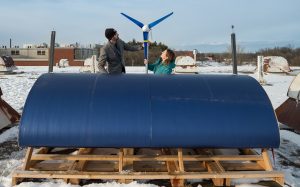CRI Startups Potentially Reduce GHG
Achieving President Biden’s Executive Order on Tackling the Climate Crisis At Home and Abroad goal of net-zero emissions of greenhouse gases (GHG) by 2050 will require a broad scope of climate-tech innovations across many industry sectors.
Argonne National Laboratory’s Chain Reaction Innovations (CRI) has been developing very early stage deep-tech/climate-tech innovations for the past five years that have the potential to meaningfully reduce GHG.
Emission Reduction Potential
CRI’s five alumni companies together have an emissions reduction potential of over 2.5 gigatons of equivalent carbon dioxide (GtCO2e) per year by 2030 and the ten companies currently in the program together have an emissions reduction potential of over 0.1 GtCO2e per year by 2030. As a comparison, human-generated emissions amount to roughly 50 GtCO2e per year, making the potential reduction impact by CRI startups significant.
“The new energy crisis is climate change. We knew that all of our startups were developing technologies that could reduce GHG emissions. Thanks to the CRANE tool and the work Rho Al and collaborators have done, each can provide defensible GHG reduction potential numbers …” John Carlisle, Director, Chain Reaction Innovations.
CRANE Assessment Tool
Estimating the potential for GHG emission reductions for early-stage companies like those in CRI’s portfolio is challenging. The recently developed CRANE tool offers an open-source methodology to assess the emissions reduction potential of climate technologies like those of CRI’s startups. One key objective is to inform investors about the potential for their investments to mitigate future emissions, allowing better deployment of limited resources.

Investors looking to support climate-tech innovations are joined by a growing number of individuals and institutions that recognize the need to reduce GHG emissions. Not only is it critical to move these innovations into the market immediately, but it’s also vital that resources are directed at technologies with the greatest potential for reducing or eliminating GHG emissions.
The goal of the CRANE tool is to provide a standardized and uncomplicated method for calculating “the potential climate impact of new ventures and the technologies, solutions, or business models they bring to market,” according to its developers. The tool was created by Prime Coalition with the support of the New York State Energy & Development Authority, the John D. & Catherine T. MacArthur Foundation and the Massachusetts Clean Energy Center with three development partners—Greenometry, Rho AI and Clean Energy Trust.
CRI, in partnership with Rho Al, recently completed a comprehensive application of the CRANE tool to all CRI active and alumni startups, so each company could provide GHG emission reduction potential for their technologies based on an independent analysis.
The results were more impressive than anticipated. John Carlisle, Director of Chain Reaction Innovations notes, “The new energy crisis is climate change. We knew that all of our startups were developing technologies that could reduce GHG emissions. Thanks to the CRANE tool and the work Rho Al and collaborators have done, each can provide defensible GHG reduction potential numbers to help investors, industrial partners, and customers make informed decisions with GHG emission reduction in mind.”
CO2 Reduction by Startup
Learn more about each CRI startup’s potential to reduce GHG emissions below.
Jolt Energy Storage Technologies
About Chain Reaction Innovations
Chain Reaction Innovations provides a two-year program for entrepreneurs focusing on clean energy technologies. Selected annually through an application call, the program enables innovators to work on their technology full-time, de-risking it with the help of leading experts and equipment from Argonne National Laboratory. Each cohort works to build their innovations into market-ready businesses. CRI is supported by area mentors from the Polsky Center for Entrepreneurship and Innovation at the University of Chicago and mHUB.
Chain Reaction Innovations is part of the Lab-Embedded Entrepreneurship Programs from the U.S. Department of Energy’s Office of Energy Efficiency and Renewable Energy (EERE). EERE created the Lab-Embedded Entrepreneurship Programs to provide an institutional home for innovative postdoctoral researchers to build their research into products and train to be entrepreneurs.

